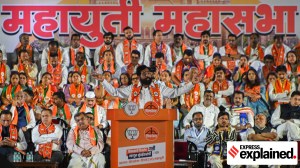Dry Vineyards
If this continues, I8217;ll have to move on to something else.8217;8217; It8217;s not easy for a rich farmer like Shrikant Khandade to s...

If this continues, I8217;ll have to move on to something else.8217;8217; It8217;s not easy for a rich farmer like Shrikant Khandade to say this.
But for the past several years in Peth near Latur 8212; famous for a product which gets exported to UK, Germany and Saudi Arabia among other countries 8212; the grapes are turning sour.
In the past three years alone, during which the monsoon has repeatedly failed in the Marathwada region, 45-year-old Khandade has spent Rs 6 lakh on water tankers and borewells so that his shrivelling vineyard would live. He spent another Rs 32 lakh on laying a pipeline to bring water from a dam, 10 km away. But the dam doesn8217;t have enough water anymore.
The losses would have been much larger had he continued to cultivate all 25 acres he had. But mounting costs forced him to clear 14 acres. Today, all that8217;s left of his farm is 12 acres of grapevine and half a dozen mango trees. His output, between eight and 15 tonnes of grapes an acre before 1992, has plunged to three tonnes an acre. 8216;8216;To make profits, one has to reap at least 10 tonnes an acre on an average. It8217;s difficult to break even after all this,8217;8217; Khandade rues.
There are at least seven to eight farmers with large holdings like him in the region. Each one of them is battling problems that range from lack of irrigation to dearth of viable crop insurance schemes, all of which take their toll on farm output.
Officials admit the situation is grim. 8216;8216;Latur exported grapes to over 180 countries. The produce this year has fallen at least 50 per cent,8217;8217; a top official in the Latur Collectorate8217;s Agriculture Department said. However, it is clear that little help comes from official quarters. Given the fall in agricultural output, Khandade8217;s immediate problem is keeping creditors at bay.
8216;8216;I have taken loans to set up a water distribution system. But it isn8217;t viable anymore. So I uprooted pipes in most places and now concentrate only on the remaining 12 acres,8217;8217; he says. Khandade owes a bank Rs 12 lakh, which he borrowed at 12.5 per cent annual interest. But running expenses on tankers is making it difficult to repay the loan.
Latur8217;s grape-growers also find it difficult to insure their crop. 8216;8216;Grape-growers find it difficult to get crop insurance. The premium is high but when it comes to settling claims the amount we get is shamefully low,8217;8217; Khandade says.
The reason is that grape, sugarcane and banana plantations generate a bare minimum yield even when conditions are not entirely unfavourable. This, in turn, makes it difficult for growers to recover insurance costs even when crop failure is relatively high and profits are marginal.
Gazing at his patchy farm, Khandade says, 8216;8216;Even if it rains this year, I won8217;t be able to clear the backlog of eight years.8217;8217; He built the packing house last year after European export norms made it necessary for growers to have such a facility.
8216;8216;The budget for this was Rs 22.5 lakh. I was to get some subsidies from the government but I have yet to receive them,8217;8217; he says.
Khandade says government should help farmers with low interest loans. Officials conceded this aspect has been neglected, but also argue that if grape-growers can afford to spend on tankers, they don8217;t really need any support from the government.
8216;8216;And what about some incentives for the foreign exchange we bring in,8217;8217; asks Khandade.
- 01
- 02
- 03
- 04
- 05































